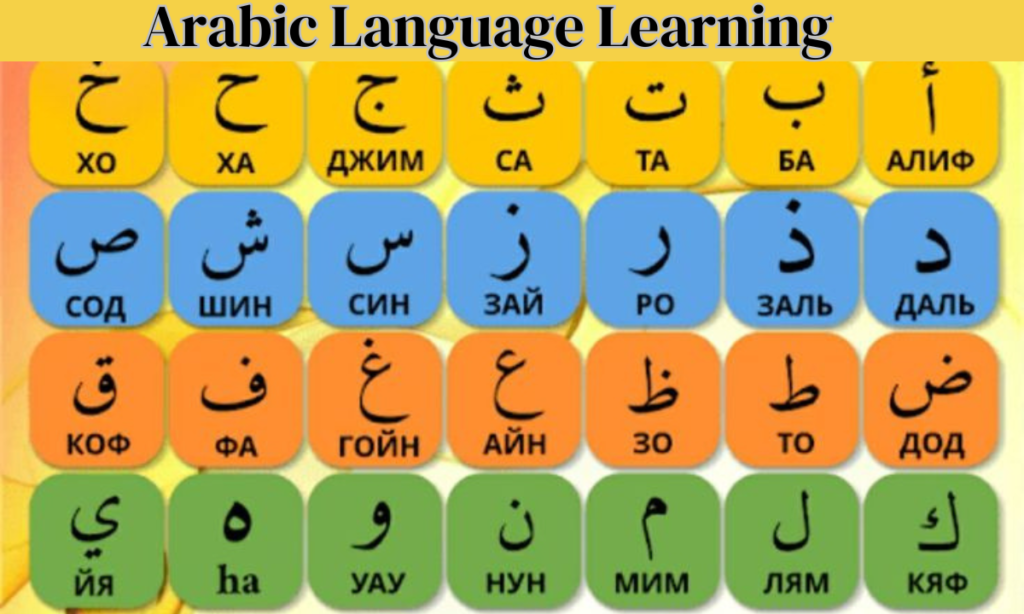With more than 400 million speakers, Arabic is one of the most frequently spoken languages in the world. It’s the official language in 26 countries and serves as a key language in business, diplomacy, and religious contexts. Learning Arabic opens doors to diverse cultures and countless opportunities.

A Brief History of Arabic
Arabic is an extremely ancient language that belongs to the Semitic language family. These languages were spoken a long, long time ago in areas like the Middle East. Arabic has been around for more than a thousand years, which is a very long time! It is a special language because it is the language of the Quran, the holy book of Islam. This makes Arabic very important for Muslims all over the world. But Arabic is not just for religion; it is also a big part of the history, art, and culture of many countries. Over the years, people have used Arabic to write poems, stories, and even scientific ideas. This makes it a very rich and special language.
Key Components of Arabic Language Learning
Understanding the Arabic Script
When you start learning Arabic, one of the most important things is to understand how the Arabic letters work. The Arabic language is written in a special way – from right to left, which is the opposite of how English is written. Arabic has 28 letters, and each letter can look a little different depending on where it is in a word. For example, the same letter might look one way at the beginning of a word, another way in the middle, and a different way at the end. Learning these different shapes is like solving a fun puzzle! Once you know how to recognize the letters and their shapes, you can start reading words, which is the first big step in learning Arabic.
Tips for Improving Reading Skills
If you want to get better at reading Arabic, it’s a good idea to start with simple books, like children’s books. These books usually have easy words and short sentences, which makes them great for practice. Once you feel more confident, you can move on to harder things, like newspapers and stories for older readers. Another helpful tip is to listen to how Arabic words are spoken while you read them. For example, you can listen to someone reading the same book or watch videos where people speak in Arabic. This will help you know how to say the words correctly and understand what they mean. Reading and listening together make learning even easier and more fun!
Writing in Arabic
Basic Writing Rules
Writing in Arabic is a little different from writing in English, but with practice, it can become easy and fun! To write in Arabic, you need to learn the special letters and how they connect to make words. Keep in mind that, unlike English, Arabic is written from right to left. This can feel strange at first, but with practice, it gets easier. You also need to learn some rules about how sentences are made, which is called grammar. For example, you learn where to put the words in a sentence so it makes sense. To get better, it’s important to practice writing often. Start by writing simple words and sentences, and over time, your handwriting will look nice, and writing in Arabic will feel natural.
Developing Fluency in Writing
To become good at writing in Arabic, it’s helpful to start with simple steps. First, try copying words and sentences from books or other texts. This helps you learn how the letters connect and improves your handwriting. Once you feel more comfortable, you can start making your sentences. For example, you can write about things you see every day, like your family, your favorite food, or what you did at school. After that, you can try writing short paragraphs with a few sentences will become easier the more you practice. Writing about everyday topics is a great way to feel confident because you already know a lot about them!
Listening Skills
Importance of Active Listening
Listening is a very important part of learning any language, including Arabic. When you listen carefully, it helps you learn how to say words correctly, which is called pronunciation. You also hear how sentences are put together, so you can understand how to make your sentences. Listening also teaches you about the culture, like how people greet each other or talk politely. This is called cultural nuances, which are the small but important things about how people use the language. To get better, you can listen to stories, songs, or conversations in Arabic. The more you listen, the more you will understand, and soon you’ll feel more confident speaking and using the language!
Resources for Enhancing Listening Skills
To get better at listening in Arabic, there are many fun and helpful tools you can use. For example, you can listen to podcasts, which are like radio shows, in Arabic. You can also enjoy Arabic songs, which help you learn new words and understand how they sound. News broadcasts in Arabic are another good way to hear how people speak in real life. There are also apps, like LingQ, that have lessons and stories in Arabic to listen to. You can even watch videos on YouTube channels that teach Arabic or tell stories in the language. Using these resources makes learning more fun and helps you hear Arabic spoken in different ways. The more you will learn and get better the more you listen! u listen, the more you will understand and improve!
Practicing Pronunciation
Pronouncing words in Arabic can be tricky because it has some special sounds that are not in other languages, like English. These sounds might feel a little strange to say at first, but with practice, you can learn them! A good way to start is by focusing on the sounds of the letters, which is called phonetics. You can listen to how native speakers say the words and try to copy them. If you know someone who speaks Arabic, ask them to help you. Talking with native speakers is one of the best ways to improve because they can correct you and teach you the right way to say things. Your pronunciation will improve the more you practice!
Building Confidence in Speaking
To feel good about speaking Arabic, you need to practice every day. Start by saying simple things, like “Hello” or “How are you? Discuss simple subjects like the weather or cuisine. If you can, join groups where people learn Arabic. You can also use apps like Tandem to talk to people who speak Arabic. These apps let you practice with friendly people becomes easier the more you speak. Soon, speaking Arabic will feel natural!
Grammar and Vocabulary in Arabic
Overview of Arabic Grammar
Arabic grammar is like a big puzzle made up of rules for how words are put together. One important part of Arabic grammar is something called “roots and patterns.” Roots are the main part of a word, and patterns are ways the root can change to make different words. For example, a verb (action word) can change depending on when it happens, like if it happened in the past, is happening now, or will happen in the future. Nouns (things or people) also change depending on if they are talking about one thing or many things. Another thing is that words in Arabic also change depending on whether they are for a boy or a girl. So, Arabic grammar has a lot of rules, but once you understand them, it gets easier to make sentences that sound right. Learning how these rules work will help you build your vocabulary and become better at speaking and writing in Arabic!
Sentence Structure
In Arabic, the way we make sentences is a little different from English. In English, we usually say the subject first, like “I eat an apple,” where “I” is the subject, “eat” is the action (verb), and “apple” is what we’re talking about (object). But in Arabic, the sentence starts with the action, called the verb. So instead of saying “I eat an apple,” in Arabic, you would start with the action, like “Eat I apple” in the order of Verb-Subject-Object. It might sound funny at first, but once you get used to it, it makes sense! To build good sentences in Arabic, it’s important to practice this structure, so your sentences sound correct and clear. When you master the Verb-Subject-Object pattern, you’ll be able to talk and write in Arabic much more easily!
Building a Robust Vocabulary
Common Words and Phrases
When you’re learning Arabic, it’s important to start with words and phrases that you will use every day. These are words like “hello,” “goodbye,” “thank you,” and “please.” Knowing these simple words will help you talk to people and understand them better. After that, you can start learning more words about different topics, like food, animals, or school. This is called learning thematic word groups. For example, you can learn words about animals like “cat,” “dog,” and “bird,” or words about food like “apple,” “bread,” and “water.” The more words you learn, the bigger your vocabulary gets. It’s good to add new words little by little, so it’s not too hard. The more words you know, the easier it will be to talk and understand Arabic!
Techniques for Vocabulary Retention
When you learn new words in Arabic, it’s important to remember them so you can use them later. One fun and easy way to remember words is by using flashcards. Flashcards are cards with the word on one side and the meaning or picture on the other side. You can look at the flashcards often to help you remember. Another way to keep words in your memory is by using something called spaced repetition. This means you look at the word again after some time has passed, like the next day, then a few days later, and so on. Doing this helps your brain remember the words for a long time. There are also apps you can use to help you practice and remember words. These apps make learning fun by using games and quizzes. The more you practice with these tools, the better you’ll get at remembering the words you learn!
Arabic Learning Difficulties and How to Get Past Them
Tackling Complex Grammar Rules
Learning Arabic grammar can sometimes feel tricky because it has a lot of rules that are different from English. For example, there are special ways to change words depending on if something happened in the past, is happening now, or will happen in the future. There are also rules about how to change words for boys or girls, and if you are talking about one thing or many things. All these rules might seem confusing at first, but don’t worry! You can make it easier by focusing on just one rule at a time. Start by learning one small rule, like how to change a verb for the past tense. Practice that rule over and over until you understand it well. Once you feel comfortable, move on to the next rule. Taking small steps and practicing each rule carefully will help you understand Arabic grammar bit by bit, and soon it won’t feel as hard!
Managing Dialect Differences
Arabic is spoken in many different ways in different countries, and each place has its own special way of speaking, called a dialect. For example, the Arabic spoken in Egypt sounds a little different from the Arabic spoken in Saudi Arabia. There are many dialects, and they can be hard to understand if you don’t know them well. But don’t worry! The best way to start learning Arabic is by learning Modern Standard Arabic (MSA). MSA is the “main” version of Arabic that everyone can understand, no matter where they are from. It is used in books, news, and schools, so learning it will help you build a strong base in the language. Once you are comfortable with MSA, you can start learning about different dialects if you want. But starting with MSA will help you understand the language better and make it easier to learn the dialects later on!
Tools and Resources for Learning Arabic
Online Platforms and Apps
There are many great tools and resources you can use to learn Arabic, and some of them are available online! Apps like Duolingo, Babbel, and Rosetta Stone are very helpful because they give you lessons that are easy to follow. These apps break learning into small steps, so you can learn one thing at a time, like new words, sentences, or grammar rules. They also have fun games and quizzes to help you remember what you learn. Another great way to learn Arabic is by watching YouTube videos. There are special channels on YouTube that teach Arabic with fun and interesting videos. These videos show you how to say words and use them in sentences. Some videos even teach you songs or stories in Arabic, which makes learning more fun. Using these online tools will help you practice and get better at speaking and understanding Arabic!
Arabic Books and Literature
Reading books in Arabic is a great way to learn the language! When you first start, it’s helpful to read simple books that are made for beginners. These books usually have easy words and short sentences, so you can practice and understand what you’re reading. As you get better at reading, you can try books that are a little more difficult, like stories or novels. Novels are longer books with more detailed stories, and they help you learn new words. You can also explore poetry, which is a special kind of writing with beautiful language and rhythm. Some people even like to read old, classical texts, which are books from a long time ago. At first, these might be harder, but they are a wonderful way to learn more about Arabic history and culture. By starting with simple books and working your way up, you can enjoy reading in Arabic and get better at it every day!
Language Exchange Programs
To feel good about speaking Arabic, you need to practice every day. Start by saying simple things, like “Hello” or “How are you? Discuss simple subjects like the weather or cuisine. If you can, join groups where people learn Arabic. You can also use apps like Tandem to talk to people who speak Arabic. These apps let you practice with friendly people. It becomes easier the more you speak. Soon, speaking Arabic will feel natural!
Benefits of Learning Arabic
Professional Opportunities
Learning Arabic can help you in many ways and may help you land a job later on. If you speak Arabic well, you can work in jobs like helping countries talk to each other. You can also help people understand Arabic by changing it to another language, like English. Many businesses like it when people know Arabic. They need it to do business with Arabic-speaking countries. Learning Arabic can open many doors for cool jobs and new chances!
Cultural Appreciation
Learning Arabic helps you understand the cultures of the Middle East. The Middle East has many special traditions, music, food, and ways of livingGaining knowledge of Arabic will help you better comprehend these concepts. You can learn about holidays, food, and how people greet each other. Learning about these things helps you respect and appreciate other cultures. Additionally, it facilitates friendships with individuals from other nations. Learning Arabic can bring you closer to people and help you kindly see the world!
Cognitive Benefits
Learning Arabic makes your brain stronger and smarter! When you learn new words, you help your memory get better. You remember words and how to use them in sentences. This aids in the retention of information. Learning Arabic also helps you solve problems. Sometimes, you need to figure out how to say something differently. This makes you better at solving problems in other parts of your life too. Learning a language helps your brain work in many ways, making you smarter!
Tips for Effective Arabic Language Learning
Consistency is Key
When you’re learning Arabic, it’s really important to practice every day. This means setting aside a little time each day to study or practice speaking, reading, or writing in Arabic. Even if it’s just for a few minutes, practicing regularly helps you get better faster. If you only practice once in a while, it can be hard to remember what you learned, but if you do it every day, your brain gets better at remembering things. Just like practicing a sport or playing a game, the more you practice Arabic, the easier it becomes. So, try to make it a habit to practice a little bit each day, and you’ll see how much you improve over time!
Immersive Learning Techniques
To learn Arabic even better, one great way is to fully surround yourself with the language, which is called immersive learning. This means you try to use Arabic as much as possible in your everyday life. You can watch movies or shows in Arabic, which will help you hear how people speak and learn new words. Listening to Arabic songs is another fun way to learn because songs have catchy tunes that make it easier to remember words. Also, talking with people who speak Arabic as their first language, called native speakers, is a great way to practice. You can ask them questions, listen to how they speak, and try to talk with them. The more you use Arabic in fun ways like these, the faster you will learn and the more confident you will feel!
Setting Realistic Goals
When you’re learning Arabic, it’s helpful to set small goals for yourself. Instead of thinking, “I want to speak Arabic perfectly,” you can break it down into smaller steps that are easier to reach. For example, you might set a goal to learn 10 new words this week or be able to say a simple sentence by the end of the month. These smaller goals are called milestones, and they help you see how much you’re improving. When you reach each milestone, you can feel proud of yourself and stay motivated to keep learning. Having specific goals also makes it easier to monitor your success because you can observe your development over time. By setting realistic goals and working towards them a little at a time, you’ll make steady progress and feel good about your learning!
Conclusion
Learning Arabic is fun and exciting! It’s not just about new words, but also about learning new ways of thinking and understanding different cultures. When you learn Arabic, you can make new friends and discover many cool opportunities. You can travel, meet people from Arabic-speaking countries, and even get great jobs. With hard work, practice, and tools like books, apps, and teachers, you will get better. The more you practice, the easier it gets to speak, read, and write in Arabic. Keep going, and learning Arabic will bring you lots of rewards!
FAQs
Q1: What is the average time required to learn Arabic?
A. Although it varies, it can take one to two years of steady work to become conversationally fluent.
Q2: Is Arabic a difficult language to learn?
It has some challenges, especially with grammar and pronunciation, but if you keep trying, it gets easier.
Q3: Should I learn Modern Standard Arabic or a dialect?
A. Start with Modern Standard Arabic for a solid foundation, then explore dialects as needed.
Q4: What are the best resources for beginners?
A. Apps like Duolingo, books, and language exchange platforms are excellent starting points.
Q5: Can I learn Arabic without a teacher?
A. Yes, but having a teacher or mentor accelerates the process and ensures proper guidance.
Allah says in the Quran, “Will they not, then, ponder over this Qur’an?”
Remember, the goal is to read with understanding and devotion, not just speed. Encourage children to enjoy the process and develop a lifelong connection with the Quran. We have been teaching the Quran online with Tajweed all over the world since 2011. We are providing Online Quran and Islamic Classes for kids at flexible times and sitting at home. 3-day free trial Classes for your satisfaction. Male and Female Tutors are available. Please take demo classes to see our service In sha Allah, you will never regret it.
Allah says in the Quran, “Will they not, then, ponder over this Qur’an?”
Remember, the goal is to read with understanding and devotion, not just speed. Encourage children to enjoy the process and develop a lifelong connection with the Quran. We have been teaching the Quran online with Tajweed all over the world since 2011. We are providing Online Quran and Islamic Classes for kids at flexible times and sitting at home. 3-day free trial Classes for your satisfaction. Male and Female Tutors are available. Please take demo classes to see our service In sha Allah, you will never regret it.


